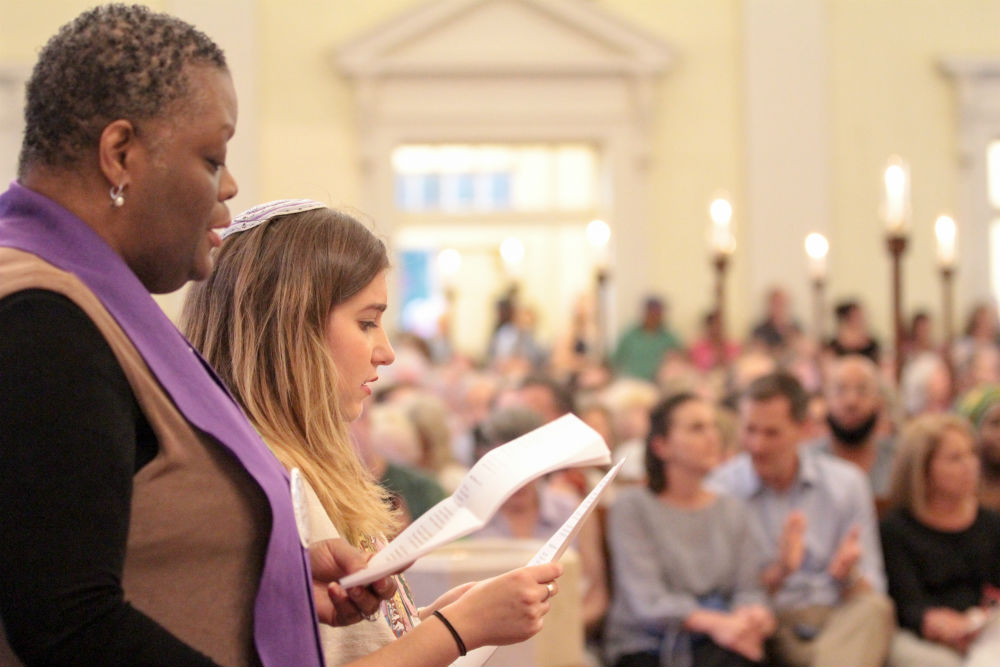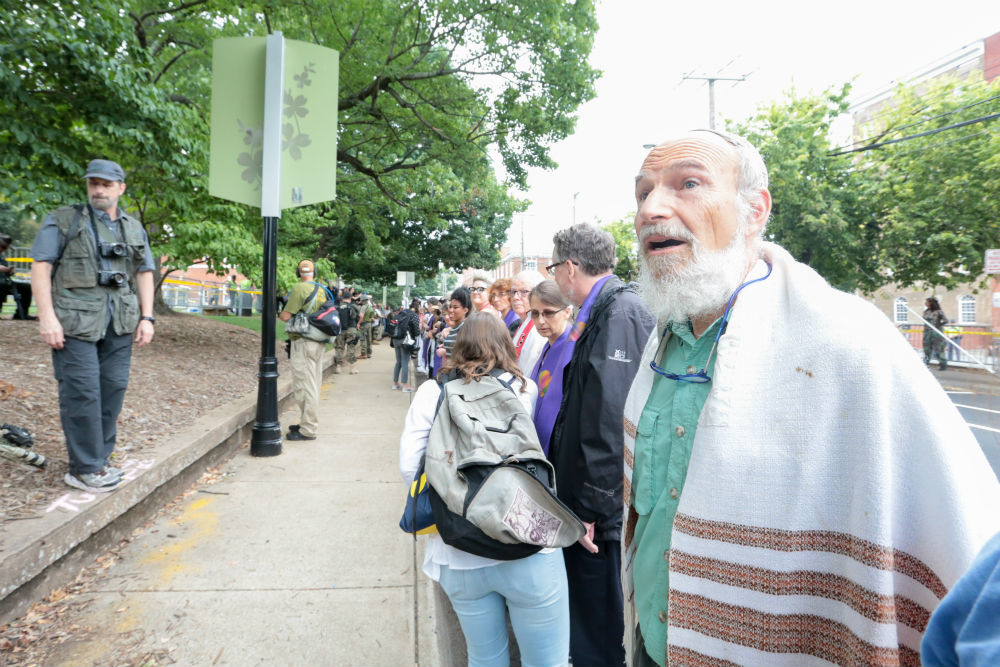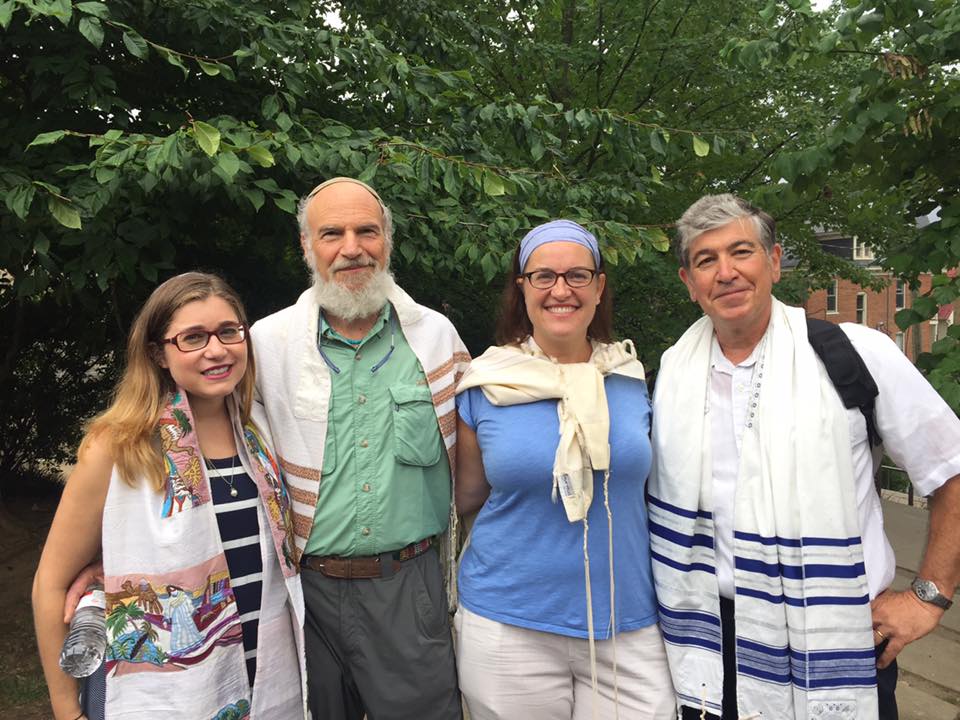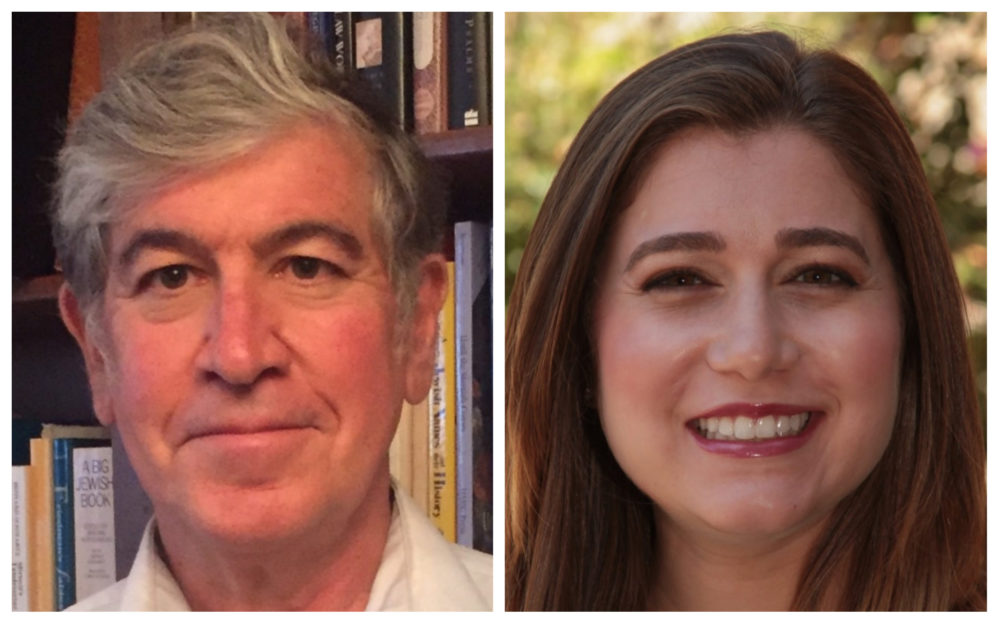On Aug. 12, 2017 Rabbi Tom Gutherz and Rabbi Rachel Schmelkin of Charlottesville’s Congregation Beth Israel — the city’s only synagogue — confronted a nightmare in their backyard: the horrifying Unite the Right Nazi rally. T’ruah was the only major national Jewish organization with a presence at the counter-protests that day.
T’ruah honored both rabbis on May 8 with the Action Under Fire award at our New York City gala.
In the Q&A below, they talk about life after the Unite the Right rally, how their priorities have shifted and offer advice for other communities confronting hate groups.
How large is Congregation Beth Israel, and what’s its history in Charlottesville?
Congregation Beth Israel was established in 1882 and has been at its current location in Charlottesville since 1902. It currently has 392 member families, including 178 children in our religious school and a preschool enrollment of 50. We estimate that there are about 5,000 Jews living in Charlottesville and the surrounding areas, including about 1500 students at the University of Virginia.
How did the events of Aug. 12, 2017 affect you and your congregation?

Our congregation began to be affected by the presence of white nationalists, Nazis, and white supremacists in May of 2017 when Richard Spencer showed up to lead the first of several torch rallies in Charlottesville. A small group from the KKK in North Carolina held a rally in July of 2017 in one of our nearby parks, followed by the violent and deadly “Unite the Right” Rally in August of 2017. Our congregation is located right downtown, literally one block from Justice Park (site of the July rally) and one block in the other direction from Emancipation Park (site of the August rally).
So many of the events of those days — the marches, the confrontations, the Nazi banners and groups of neo-Nazis marching and brawling — took place on the streets in front of and around our synagogue.
White supremacists and neo-Nazis continue to show up in downtown Charlottesville and on the University of Virginia campus. We are also one block away from the courthouses, where some of the trials related to August 12 are proceeding through the court system. So the events of last summer are still very much in our consciousness.
Have the synagogue’s priorities — or its engagement with the larger Charlottesville community — changed since last summer’s rally? Have you formed new alliances?

One of the most positive outcomes from last summer has been the way in which people of many faiths have come together. Both of us have formed and strengthened closer relationships with many non-Jewish clergy in town. Our congregation, along with many others in town, has experienced an increase in interest in learning and acting on local social justice issues, particularly issues surrounding racial justice. Rather than stepping back after the horrors of last summer, particularly the anti-Semitism we experienced, our congregation has become more and more engaged in the larger Charlottesville community, often in a very visible and public way. The events of last summer have in some ways deepened the commitment of our members to our own community and made us realize how strongly we rely on one another.
What are the greatest challenges your community faces moving forward?

We are starting to get used to the new reality of being in the center of all this activity, along with the increased security concerns it brings. We are also trying to keep our balance and continue with our very active and ongoing religious and educational programming without being driven by the agendas of the alt-right and their frequent visits to our neighborhood. One of our challenges is trying to find the right way to articulate our own concerns and feelings of vulnerability in the face of the anti-Semitism we witnessed while appreciating the larger context of our city where there is both a history and a present of unresolved racial injustice. We are looking for a way to speak our truth and raise awareness while also being sensitive to our place and complicity in the dynamics of white supremacy.
What advice would you offer other synagogues should a similar rally be planned in their community?

Form alliances now and create strong relationships with the interfaith community. In Charlottesville, we have a group called the Charlottesville Clergy Collective (CCC). Formed in the wake of the horrific shootings at the AME Church in Charleston South Carolina the founders believed that interfaith clergy needed to know each other better in case a similar tragedy ever struck our town. Because of the CCC, we already had many of the relationships in place that helped us to come together across different faiths and respond to the hate and violence of last summer. We discovered that a broad clergy alliance, because of the nature of our leadership roles within congregations, was able to reach deep in the community to mobilize people and resources as well as to articulate a religious and prophetic voice in the public sphere.
And bring in experts to help you prepare. Congregate Charlottesville, an interfaith clergy group, formed last summer in the weeks leading up to August 12th. Through Congregate Charlottesville, clergy came together with local activists. Experts were brought in to train community members to do non-violent direct action and know what to do in potentially violent and volatile situations. Congregate Charlottesville helped provide medic tents and consulted on other safety measures to the main church used as a safe space on August 12th. Without this training and the leaders of Congregate Charlottesville, we would have been much less prepared for what turned out to be a nightmarish weekend. We also received a lot of input and counsel from the Anti-Defamation League (which tracks anti-Semitic activity both on the streets and on the web) as well as our colleagues at T’ruah, the Union for Reform Judaism and Bend the Arc who helped us to shape our response, as well as community relations personnel in the wider Jewish community.
How can T’ruah and the larger Jewish community support you and your community in fighting hate and advocating for social justice?
Charlottesville continues to be a focus for white supremacist and neo-Nazi hatred. We need T’ruah to help us in making our country aware that last summer was not an isolated incident that has since disappeared. We are dealing with the presence of hateful people in Charlottesville on a regular basis; the white supremacists and neo-Nazis who don’t live here have gone back to wherever they live and could bring similar hate and danger to communities all over the country. And in the event, that another Unite the Right Rally comes our way, we need boots on the ground in Charlottesville just like last summer. T’ruah, through the activities of its many members in diverse places and network of relationships in the larger social justice community, continues to inspire and inform our own initiatives here.
Come meet Rabbi Gutherz and Rabbi Schmelkin at T’ruah’s May 8 gala. Get tickets here.


